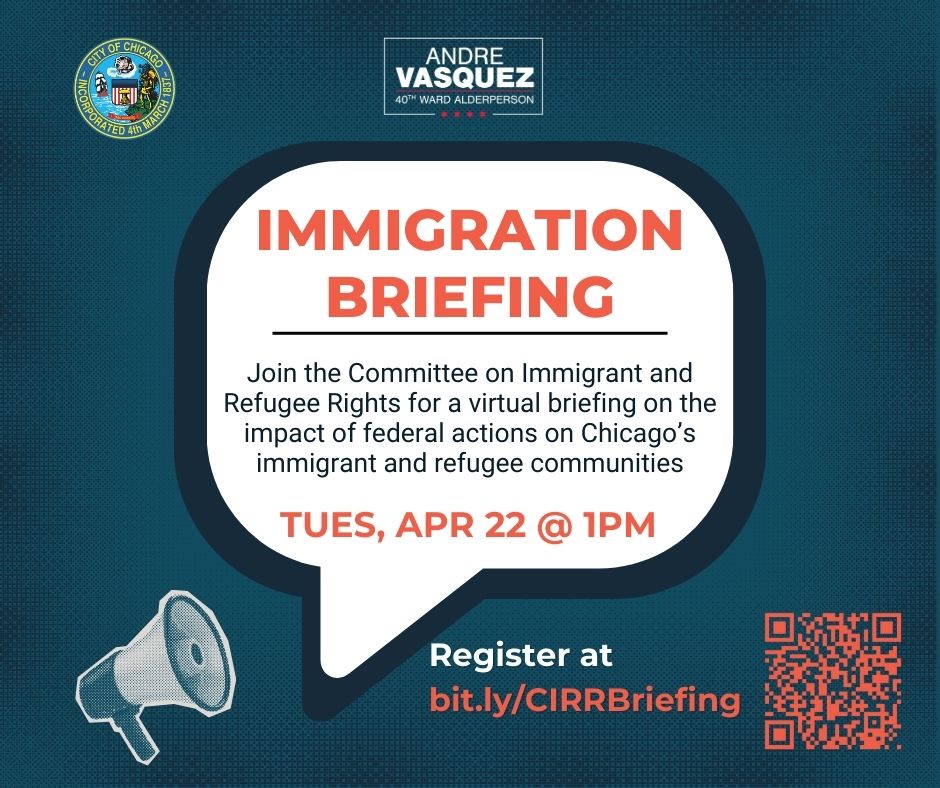
On Tuesday, March 18th, the Committee on Immigrant and Refugee Rights hosted an Immigration Briefing, during which immigration attorneys discussed recent federal immigration actions.
If you missed the briefing, you can find a summary below, as well as ways you can get involved.
Enforcement Actions
Here are some of the immigration enforcement trends that attorneys have reported:
Detentions of Legal Permanent Residents and Visa Holders
Recently, there have been a number of people targeted for ICE enforcement that do not have a criminal record, were not in violation of any immigration laws, and appear to have been politically motivated, including legal permanent resident and Columbia University graduate student Mahmoud Khalil.
In the case of Mahmoud Khalil, the government used a little-known deportability ground (INA 237) that allows the US to strip people of their permanent residency if the Secretary of State has reasonable grounds to believe their “presence or activities in the US would have potentially serious adverse foreign policy consequences.” However, the use of this ground against expressions of free speech is not precedented, and risks eroding significantly constitutionally protected civil liberties.
Alien Enemies Act
Just over a week ago, the administration deported 238 Venezuelans and sent them to El Salvador, where they have been imprisoned without trial in a maximum-security prison.
The administration used the Alien Enemies Act as grounds for the deportation. This act has only been used three times in U.S. history, all of which have been during war—most prominently to justify the mass internment of Japanese and Japanese Americans during WWII. The law only allows the president to detain noncitizens when “there is a declared war…or any invasion” that is imminent or threatened by a foreign nation.
The United States is not at war with Venezuela, nor has it been subject to invasion by Venezuela. The administration laid the groundwork to invoke this law by declaring “Tren de Aragua” as a terrorist organization and referring to migration as an invasion. However, if any of those who were deported were indeed members of the Tren de Aragua gang, our judicial system requires that they be criminally charged and given trial.
A federal judge blocked the administration from deporting noncitizens under the Alien Enemies Act, and ordered them to immediately turn the planes carrying noncitizens around. The administration did not comply.
Immigration attorneys have pointed to the similarities in these unprecedented enforcement actions, by targeting groups that may be controversial to large parts of the population (e.g. alleged gang members, or pro-Palestinian activists). But it’s important to remember that regardless of your opinion on someone’s beliefs or background, any threat to one person’s civil rights is a threat to all of our civil rights. In order to maintain our democracy, we have to make sure that our justice system continues to function fairly.
Registration Requirements for Immigrants
Being in the U.S. without immigration status is not a crime. It is a civil violation, for which the penalty is deportation. The Supreme Court has made it clear that “as a general rule, it is not a crime for a[n undocumented immigrant] to remain present in the United States.”
However, the administration is attempting to force immigrants to register, and impose criminal penalties for those who fail to do so.
Under this program, undocumented immigrants would be required to:
- Register and provide fingerprints
- Carry proof of compliance if one is 18 years of age or older
- Notify DHS in writing of each change of address within 10 days of moving
The penalty for failing to comply with these requirements would be considered a criminal offense, and punishable with fines up to $5,000 and imprisonment.
This policy leaves “unregistered” immigrants to choose between two risky options: 1) registering, which may put them at risk of deportation; or 2) failing to register, which would put them at risk of future criminal prosecution.
The requirement that “registered” immigrants carry registration papers also raised concerns about racial profiling, and that immigrants who are registered—even those with legal immigration status—may be arrested and prosecuted for failing to carry proof of their registration.
This requirement will not be enacted until April 11th, 2025. The public comment for this policy is still open! If you would like to submit your feedback, you can do so on the Federal Government Regulations website.
Threats to Public Benefits
Public benefits like Medicaid, CHIP, housing and benefits for veterans, seniors, and children, and more are at risk as the battle over federal funding continues.
The Defund Our Communities Act (HR32) also seeks to end federal funds for “sanctuary” jurisdictions, including Chicago. The act is currently awaiting a floor vote in the U.S. House of Representatives. If you would like to submit feedback on either of these issues, you can contact your Congressional representatives.
Calls to Action
If you would like to get involved, you can take the following actions:
- Submit public comment on the administration’s forced registration for immigrants
- Consider training to become a Legal Observer
The next immigration briefing is on Tuesday, April 22nd at 1pm, and you can register at bit.ly/CIRRBriefing!